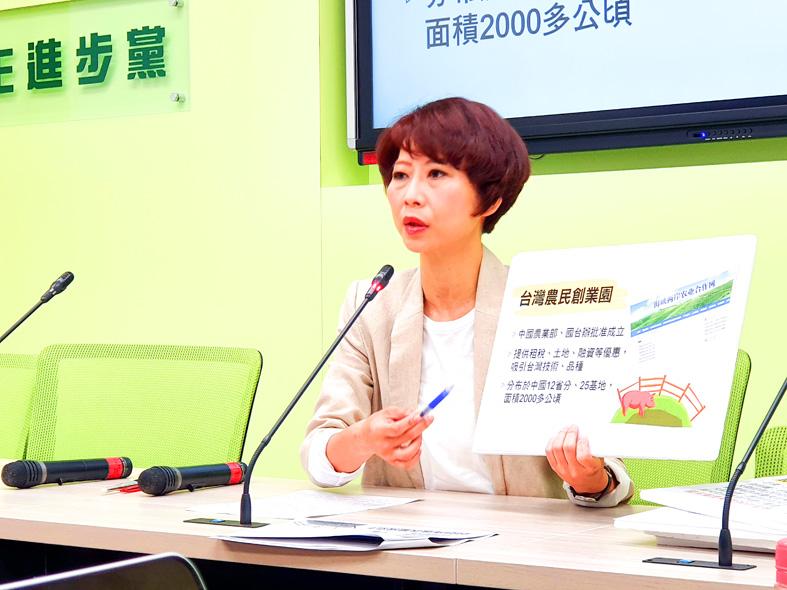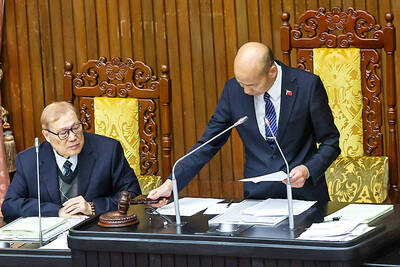The previous Chinese Nationalist Party (KMT) administration helped export Taiwan’s agricultural know-how to China, Democratic Progressive Party (DPP) Legislator Chen Ting-fei (陳亭妃) said yesterday.
After China on Friday last week abruptly announced that starting from Monday it would suspend imports of pineapples from Taiwan, Chen on Tuesday said the ban was a result of the KMT working with China.
Soon after the ban was announced, Chinese state-run media started promoting pineapples grown in Guangdong Province, including Taiwanese-developed golden diamond pineapples.

Photo: Chien Hui-ju, Taipei Times
At a news conference in Taipei yesterday, Chen said that the flow of farming and fruit production knowledge from Taiwan to China was facilitated by KMT officials, and had intensified during former president Ma Ying-jeou’s (馬英九) administration from 2008 to 2016.
“During those years, many KMT officials frequently traveled to China for trade, helping China with new farming methods,” Chen said, describing KMT officials as “compradors.”
Former ministers of agriculture Paul Sun (孫明賢) and Chen Bao-ji (陳保基) played key roles in helping China, Chen Ting-fei said.
Sun headed the Council of Agriculture from 1992 to 1996, while Chen Bao-ji was in office from 2012 to 2016.
Working with KMT politicians, the Chinese government started the Taiwan Farmers Pioneers Park (台灣農民創業園) program in 2005, which offered Taiwanese farmers low-interest loans, inexpensive land and other favorable terms to take their skills, seeds and knowledge to China, Chen Ting-fei said.
Under Ma’s administration, the pioneer park expanded from four to 25 sites across 12 provinces, she said.
Sun took Chen Bao-ji on numerous trips to visit the sites and provide consultation, she added.
In addition to golden diamond pineapples developed by the Taiwan Agricultural Research Institute in 1998, KMT figures have passed on other Taiwanese-cultivated and refined fruits to China, including mangoes, dragon fruits and black pearl wax apples, she said.
Ma’s administration promoted closer agricultural ties with China, and his government took the lead in encouraging businesspeople and agricultural workers to work in China, Executive Yuan spokesman Lo Ping-cheng (羅秉成) said separately yesterday.
By contrast, President Tsai Ing-wen’s (蔡英文) administration has been working to diversify agricultural sales by exploring new markets, he said.
While the public is concerned about the effects of China’s abrupt pineapple ban, the government should consider if it could take legal action to prevent similar incidents from occurring, Lo said.
Chen Bao-ji yesterday said that Chen Ting-fei should specify which species and techniques he had helped export to China.
Regarding the pineapple ban, he said that the issue should not be politicized, but treated as related to biosafety and trade negotiations.
Chen Ting-fei should not attack Sun, who served as an ambassador-at-large during the administration of former president Chen Shui-bian (陳水扁), he added.
Sun died in 2018.
The KMT on Wednesday wrote on Facebook that there was no evidence to support Chen Ting-fei’s claims, calling it a smear campaign.
Citing a 2005 news report, the KMT said that a Mainland Affairs Council report at the time had shown that the nation’s agricultural technology was flowing to China during Chen Shui-bian’s administration.
The KMT added that the government had taken action during Ma’s administration to protect Taiwanese agricultural technology, including the establishment in 2011 of an agricultural intellectual property rights council.

DEFENDING DEMOCRACY: Taiwan shares the same values as those that fought in WWII, and nations must unite to halt the expansion of a new authoritarian bloc, Lai said The government yesterday held a commemoration ceremony for Victory in Europe (V-E) Day, joining the rest of the world for the first time to mark the anniversary of the end of World War II in Europe. Taiwan honoring V-E Day signifies “our growing connections with the international community,” President William Lai (賴清德) said at a reception in Taipei on the 80th anniversary of V-E Day. One of the major lessons of World War II is that “authoritarianism and aggression lead only to slaughter, tragedy and greater inequality,” Lai said. Even more importantly, the war also taught people that “those who cherish peace cannot

STEADFAST FRIEND: The bills encourage increased Taiwan-US engagement and address China’s distortion of UN Resolution 2758 to isolate Taiwan internationally The Presidential Office yesterday thanked the US House of Representatives for unanimously passing two Taiwan-related bills highlighting its solid support for Taiwan’s democracy and global participation, and for deepening bilateral relations. One of the bills, the Taiwan Assurance Implementation Act, requires the US Department of State to periodically review its guidelines for engagement with Taiwan, and report to the US Congress on the guidelines and plans to lift self-imposed limitations on US-Taiwan engagement. The other bill is the Taiwan International Solidarity Act, which clarifies that UN Resolution 2758 does not address the issue of the representation of Taiwan or its people in

The Philippines yesterday criticized a “high-risk” maneuver by a Chinese vessel near the disputed Scarborough Shoal (Huangyan Island, 黃岩島) in a rare incident involving warships from the two navies. The Scarborough Shoal — a triangular chain of reefs and rocks in the contested South China Sea — has been a flash point between the countries since China seized it from the Philippines in 2012. Taiwan also claims the shoal. Monday’s encounter took place approximately 11.8 nautical miles (22km) southeast” of the Scarborough Shoal, the Philippine military said, during ongoing US-Philippine military exercises that Beijing has criticized as destabilizing. “The Chinese frigate BN 554 was

LEISURE: The new law adds Confucius’ birthday, the anniversary of the Battle of Guningtou, Constitution Day and Little New Year as national holidays The Legislative Yuan yesterday passed new legislation adding four national holidays and making Workers’ Day a national holiday for all sectors. The Chinese Nationalist Party (KMT) and the Taiwan People’s Party used their combined majority in the legislature to push the jointly proposed draft through its third and final reading. This new law supersedes the existing regulations for the implementation of memorial days and state holidays, which are administered by the Ministry of the Interior. The new law recognizes Confucius’ birthday on Sept. 28, the anniversary of the Battle of Guningtou on Oct. 25, Constitution Day on Dec. 25 and “Little New Year,”